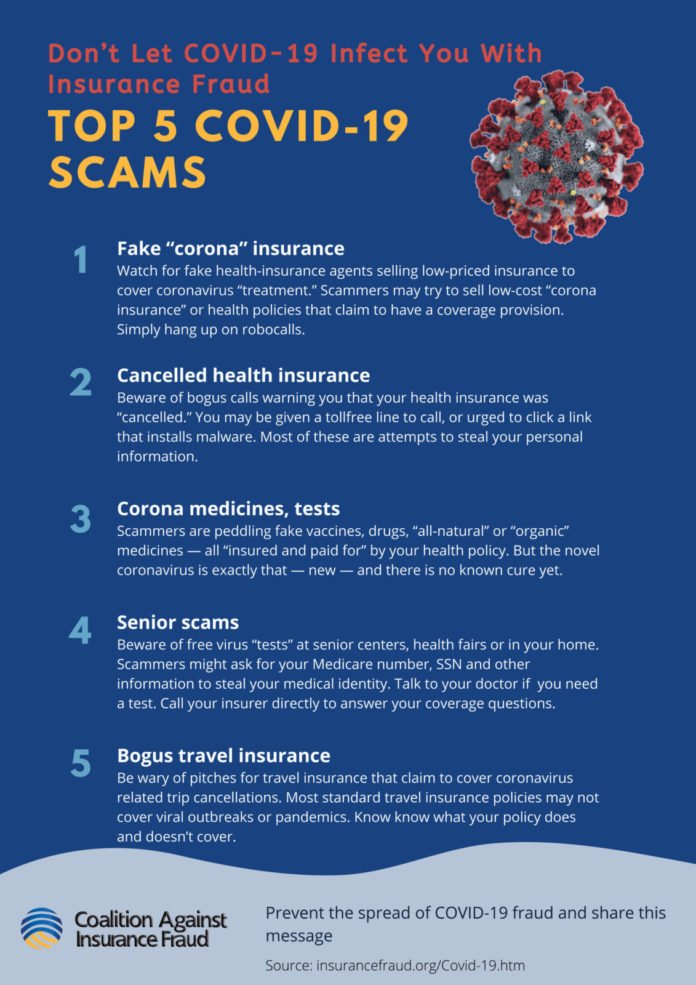The global pandemic is bringing out the best — and the worst — in people all over the world.
As if a deadly global health crisis, rampant virus, unprecedented unemployment and financial impacts weren’t bad enough, criminals are preying on people’s fears and the desire to protect themselves and loved ones using fake testing kits, miracle cures and other malevolent money-making scams.
Don’t become a victim.
The Monroe County Sheriff’s Office, along with several national agencies, are warning people of the increasing number of scams related to COVID-19.
The sheriff’s office issued the following warning on Thursday, March 26: The sheriff’s office was made aware Thursday that fake COVID-19 test kits containing toxic substances were being shipped globally. Last weekend, the U.S. Customs and Border Protection intercepted hundreds of such counterfeit test kits….The fake test kits were labeled “Corona Virus 2019nconv (COVID-19)” and “Virus1 Test Kit.” One suspect was subsequently arrested in London by Homeland Security Investigations and United Kingdom authorities.”
Monroe County Sheriff Rick Ramsay is urging all residents not to buy test kits online or from anyone other than their known healthcare provider.
In addition, the Federal Communications Commission has launched a warning page of coronavirus-related Consumer Warnings and Safety Tips.
The page emphasizes that, “phone scammers have seized the opportunity to prey on consumers.”
Scam phone calls and text messages offer free home testing kits, promote bogus cures, sell health insurance, and prey on virus-related fears, the FCC states.
“Do not click on links in texts related to the virus, and check cdc.gov/coronavirus for the most current information,” the site states.
Other hoaxes claim to come from “a neighbor,” and warn victims falsely that the government is preparing to order a mandatory two-week quarantine. It wrongfully instructs victims to go out and stock up on supplies.
The World Health Organization also issued a recent warning about criminals taking advantage of the pandemic to steal money or sensitive personal information from consumers. It urges people to be wary of phone calls and text messages that purport to be from the WHO, or charity organizations, asking for account information or donations via credit card over the phone.
Do not give anyone your personal, bank or credit card information over the phone.
Other criminal opportunists are also making phone calls that offer heating and air-conditioning duct cleaning as a way to “protect” your home and family from the virus. These callers obtain personal addresses and credit card information as “pre-payment” or a deposit.
Finally, as the federal government prepares to issue assistance checks to individuals and couples, some scammers are calling people and claiming to be “verifying their personal information and bank account information so the funds can be released.”
That will not happen, officials emphasize.
“No one will call or text you to verify your personal information or bank account details,” The FCC states.
Those who think they’ve been victimized are advised to contact law enforcement immediately.
PROTECT YOURSELF FROM COVID-19 CRIMINAL SCAMS
- Do not respond to calls or texts from unknown numbers, or any others that appear suspicious.
- Never share your personal or financial information via email, text messages, or over the phone. Legitimate entities will not request this information via phone or email.
- Be suspicious anytime you’re pressured to share information or make an immediate payment.
- Scammers often spoof phone numbers to trick you into answering or responding to numbers that look local or familiar.
- Government agencies will never ask for personal information or money over the phone.
- Do not click any links in a text message. If a friend sends you a text with a suspicious link that seems out of character, call them to make sure they weren’t hacked.
- Always check on a charity (for example, by calling or looking at its actual website) before donating. (Learn more about charity scams.)
For more information about scam calls and texts, visit the FCC Consumer Help Center and the FCC Scam Glossary. You can also file a complaint about such scams at fcc.gov/complaints.
























